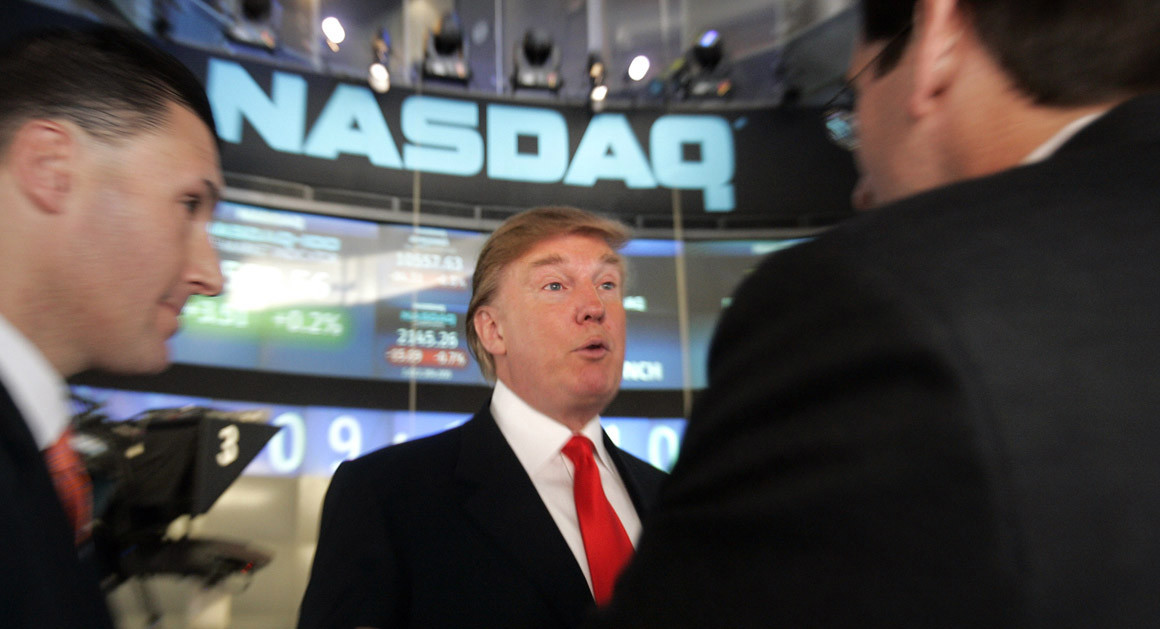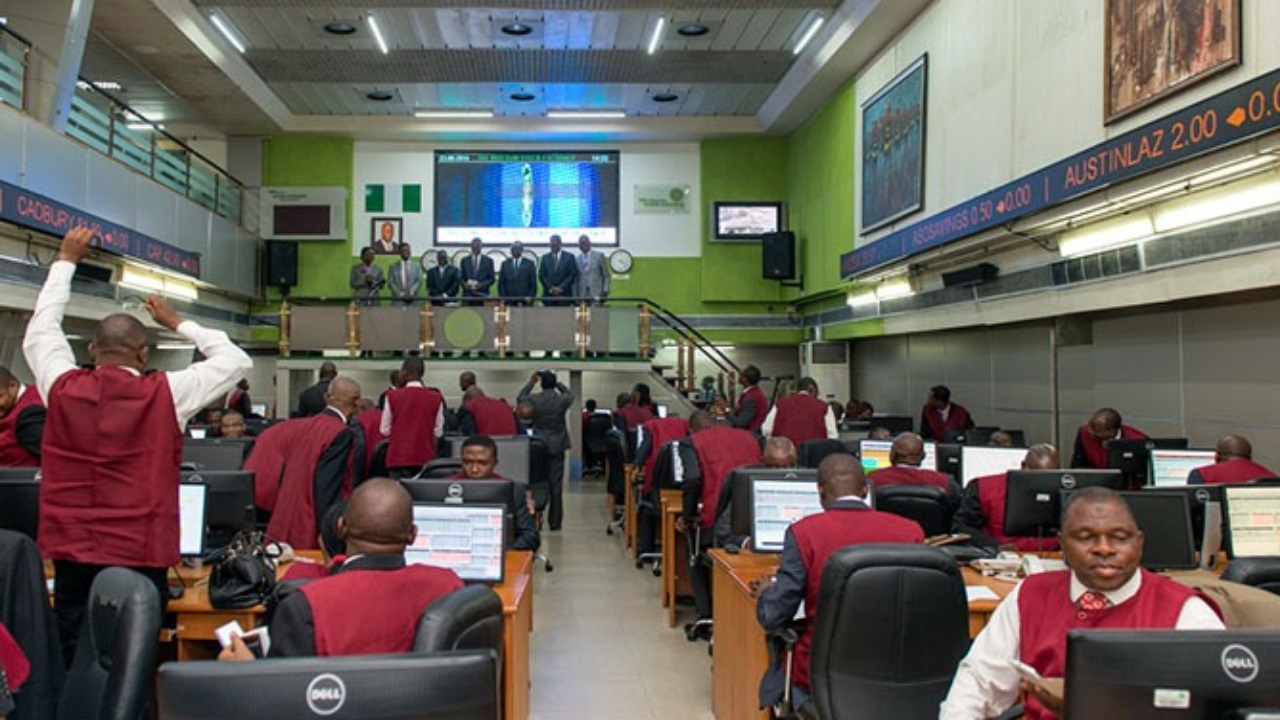Economy
Renewed Trade Concerns May Lead to Pullback on Wall Street

By Investors Hub
The major U.S. index futures are pointing to a lower opening on Monday, with stocks likely to give back ground after moving notably higher last week.
Lingering trade concerns may weigh on the markets amid reports President Donald Trump intends to proceed with plans to impose tariffs on $200 billion worth of Chinese goods as early as today.
A report from the Wall Street Journal said the new tariffs would bet set at 10 percent, lower than the 25 percent previously floated by the administration.
The threat of new tariffs could still lead China to decline an offer to hold high-level trade talks, as the country is not prepared to negotiate with a ?gun pointed to its head,? the Journal noted.
In a post on Twitter this morning, Trump claimed tariffs have put the U.S. in a very strong bargaining position and called subsequent cost increases ?almost unnoticeable.?
China has pledged to retaliate to any new tariffs imposed by the U.S., with reports suggesting the communist country could go beyond raising tariffs on U.S. imports and restrict exports of goods critical to U.S. manufacturing.
Stocks fluctuated over the course of the trading session on Friday before ending the day little changed. The major averages finished the session on opposite sides of the unchanged line following the gains posted on Thursday.
While the Nasdaq edged down 3.67 points or 0.1 percent to 8,010.04, the Dow inched up 8.68 points or less than a tenth of a percent to a seven-month closing high of 26,154.67 and the S&P 500 crept up 0.80 points or less than a tenth of a percent to 2,904.98.
Despite the lackluster close on the day, the major averages all moved higher for the week. The Dow climbed by 0.9 percent, the Nasdaq surged up by 1.4 percent and the S&P 500 jumped by 1.2 percent.
The roughly flat close on Wall Street came after a report from Bloomberg said Trump has instructed aides to proceed with plans to impose tariffs on an additional $200 billion worth of Chinese goods.
Citing people familiar with the matter, Bloomberg said Trump held a meeting on Thursday to discuss the tariffs with top trade advisers, including Treasury Secretary Steven Mnuchin, Commerce Secretary Wilbur Ross and U.S. Trade Representative Robert Lighthizer.
The latest news came on the heels of reports earlier this week indicting the U.S. has proposed holding a new round of trade talks with China in the near future.
Traders were also digesting a slew of U.S. economic data, including a report showing retail sales increased by much less than expected in August.
The Commerce Department said retail sales inched up by 0.1 percent in August after climbing by an upwardly revised 0.7 percent in July.
Economists had expected retail sales to rise by 0.4 percent compared to the 0.5 percent increase originally reported for the previous month.
Excluding the decrease in auto sales, retail sales rose by 0.3 percent in August after jumping by an upwardly revised 0.9 percent in July.
Ex-auto sales had been expected to climb by 0.5 percent compared to the 0.6 percent growth originally reported for the previous month.
Meanwhile, a separate report from the University of Michigan showed a much bigger than expected improvement in consumer sentiment in September.
The report said the consumer sentiment index jumped to 100.8 in September from 96.2 in August. Economists had expected the index to inch up to 96.6.
The Federal Reserve also released a report showing industrial production rose by slightly more than expected in the month of August.
The Fed said industrial production climbed by 0.4 percent in August, matching the upwardly revised increase in July.
Economists had expected production to rise by 0.3 percent compared to the 0.1 percent uptick originally reported for the previous month.
Most of the major sectors ended the day showing only modest moves, although considerable strength was visible among steel stocks. Reflecting the strength in the steel sector, the NYSE Arca Steel Index advanced by 1.5 percent.
Brokerage stocks also turned in a strong performance on the day, resulting in a 1.3 percent gain by the NYSE Arca Broker/Dealer Index. The index climbed further off the seven-month closing low set on Wednesday.
Semiconductor and transportation stocks also showed notable moves to the upside, while tobacco stocks extended the pullback seen in the previous session.
Economy
Why Transparency Matters in Your Choice of a Financial Broker

Choosing a Forex broker is essentially picking a partner to hold the wallet. In 2026, the market is flooded with flashy ads promising massive leverage and “zero fees,” but most of that is just noise. Real transparency is becoming a rare commodity. It isn’t just a corporate buzzword; it’s the only way a trader can be sure they aren’t playing against a stacked deck. If a broker’s operations are a black box, the trader is flying blind, which is a guaranteed way to blow an account.
The Scam of “Zero Commissions”
The first place transparency falls apart is in the pricing. Many brokers scream about “zero commissions” to get people through the door, but they aren’t running a charity. If they aren’t charging a flat fee, they are almost certainly hiding their profit in bloated spreads or “slippage.” A trader might hit buy at one price and get filled at a significantly worse one without any explanation. This acts as a silent tax on every trade. A transparent broker doesn’t hide the bill; they provide a live, auditable breakdown of costs so the trader can actually calculate their edge.
The Conflict of Market Making
It is vital to know who is on the other side of the screen. Many brokers act as “Market Makers,” which is a polite way of saying they win when the trader loses. This creates a massive conflict of interest. There is little incentive for a broker to provide fast execution if a client’s profit hurts their own bottom line. A broker with nothing to hide is open about using an ECN or STP model, simply passing orders to the big banks and taking a small, visible fee. If a broker refuses to disclose their execution model, they are likely betting against their own clients.
Regulation as a Safety Net
Transparency is worthless without an actual watchdog. A broker that values its reputation leads with its licenses from heavy-hitters like the FCA or ASIC. They don’t bury their regulatory status in the fine print or hide behind “offshore” jurisdictions with zero oversight. More importantly, they provide proof that client funds are kept in segregated accounts. This ensures that if the broker goes bust, the money doesn’t go to their creditors—it stays with the trader. Without this level of openness, capital is essentially unprotected.
The Withdrawal Litmus Test
The ultimate test of a broker’s transparency is how they handle the exit. There are countless horror stories of traders growing an account only to find that “technical errors” or vague “bonus terms” prevent them from withdrawing their money. A legitimate broker has clear, public rules for getting funds out and doesn’t hide behind a wall of unreturned emails. If a platform makes it difficult to see the exit strategy, it’s a sign that the front door should have stayed closed.
Conclusion
In 2026, honesty is the most valuable feature a broker can offer. It is the foundation that allows a trader to focus on the charts instead of worrying if their stops are being hunted. Finding a partner with clear pricing, honest execution, and real regulation is the first trade that has to be won. Flashy marketing is easy to find, but transparency is what actually keeps a trader in the game for the long haul.
Economy
Nigeria’s Stock Market Indices Shrink 0.41% Amid Panic Sell-Offs

By Dipo Olowookere
The Nigerian Exchange (NGX) Limited came under panic sell-offs on Thursday, as the investing community awaits the outcome of a probe into trading activities around one of the stocks on the bourse.
On Monday, trading in Zichis equities was prohibited by the regulator after it gained almost 900 per cent in one month of being listed by introduction on the growth board of the exchange.
This action triggered cautious trading on Customs Street, and things have not remained the same since then.
Yesterday, the key performance indices of the Nigerian bourse further depreciated by 0.41 per cent, the third straight loss this week, as investors book profit before being trapped.
It was observed that the energy industry gained 0.12 per cent and was the only one in green, as the industrial goods space shed 1.19 per cent, the banking counter depreciated by 0.63 per cent, the insurance sector lost 0.32 per cent, and the consumer goods segment tumbled by 0.03 per cent.
As a result, the All-Share Index (ASI) contracted by 802.39 points to 193,567.81 points from 194,370.20 points, and the market capitalisation decreased by N515 billion to N124.239 trillion from N124.754 trillion.
During the session, investors traded 868.5 million shares worth N31.5 billion in 69,310 deals compared with the 1.4 billion shares valued at N46.2 billion exchanged in 70,222 deals at midweek, showing a drop in the trading volume, value, and number of deals by 37.96 per cent, 31.82 per cent, and 1.30 per cent, respectively.
Jaiz Bank led the activity chart with 78.9 million equities valued at N1.2 billion, Japaul traded 73.3 million stocks worth N274.8 million, Access Holdings exchanged 66.9 million shares for N1.7 billion, Chams sold 56.9 million equities worth N239.6 million, and Zenith Bank transacted 45.5 million stocks valued at N4.1 billion.
The worst-performing stock for the day was Jaiz Bank after it lost 9.98 per cent to trade at N12.63, Ikeja Hotel declined by 9.90 per cent to N37.75, John Holt shrank by 9.90 per cent to N8.65, Enamelware slipped by 9.88 per cent to N36.50, and Cadbury went down by 9.69 per cent to N61.95.
On the flip side, FTN Cocoa was the best-performing stock after it gained 10.00 per cent to sell for N6.05, RT Briscoe improved by 9.95 per cent to N11.38, Deap Capital soared 9.92 per cent to N6.98, Japaul grew by 9.91 per cent to N3.77, and Ellah Lakes surged 9.72 per cent to N11.85.
Investor sentiment remained bearish as the exchange finished with 30 price gainers and 38 price losers, implying a negative market breadth index.
Economy
Champion Breweries Concludes Bullet Brand Portfolio Acquisition

By Aduragbemi Omiyale
The acquisition of the Bullet brand portfolio from Sun Mark has been completed by Champion Breweries Plc, a statement from the company confirms.
This marks a transformative milestone in the organisation’s strategic expansion into a diversified, pan-African beverage platform.
With this development, Champion Breweries now owns the Bullet brand assets, trademarks, formulations, and commercial rights globally through an asset carve-out structure.
The assets are held in a newly incorporated entity in the Netherlands, in which Champion Breweries holds a majority interest, while Vinar N.V., the majority shareholder of Sun Mark, retains a minority stake.
Bullet products are currently distributed in 14 African markets, positioning Champion Breweries to scale beyond Nigeria in the high-growth ready-to-drink (RTD) alcoholic and energy drink segments.
This expansion significantly broadens the brewer’s addressable market and strengthens its revenue base with an established, profitable portfolio that already enjoys strong brand recognition and consumer loyalty across multiple markets.
“The successful completion of our public equity raises, together with the formal close of the Bullet acquisition, marks a defining moment for Champion Breweries.
“The support we received from both existing shareholders and new investors reflects strong confidence in our long-term strategy to build a diversified, high-growth beverage platform with pan-African scale.
“Our focus now is on disciplined execution, integration, and delivering sustained value across markets,” the chairman of Champion Breweries, Mr Imo-Abasi Jacob, stated.
Through this transaction, Champion Breweries is expected to achieve enhanced foreign exchange earnings, expanded distribution leverage across African markets, integrated supply chain efficiencies, portfolio diversification into high‑growth consumer beverage categories, and strengthened presence in the RTD and energy drink segments.
The acquisition accelerates Champion Breweries’ transition from a regional brewing business to a multi-category consumer platform with continental reach.
Bullet Black is Nigeria’s leading ready-to-drink alcoholic beverage, while Bullet Blue has built a strong presence in the energy drink category across several African markets.
-

 Feature/OPED6 years ago
Feature/OPED6 years agoDavos was Different this year
-
Travel/Tourism10 years ago
Lagos Seals Western Lodge Hotel In Ikorodu
-

 Showbiz3 years ago
Showbiz3 years agoEstranged Lover Releases Videos of Empress Njamah Bathing
-

 Banking8 years ago
Banking8 years agoSort Codes of GTBank Branches in Nigeria
-

 Economy3 years ago
Economy3 years agoSubsidy Removal: CNG at N130 Per Litre Cheaper Than Petrol—IPMAN
-

 Banking3 years ago
Banking3 years agoSort Codes of UBA Branches in Nigeria
-

 Banking3 years ago
Banking3 years agoFirst Bank Announces Planned Downtime
-

 Sports3 years ago
Sports3 years agoHighest Paid Nigerian Footballer – How Much Do Nigerian Footballers Earn




















